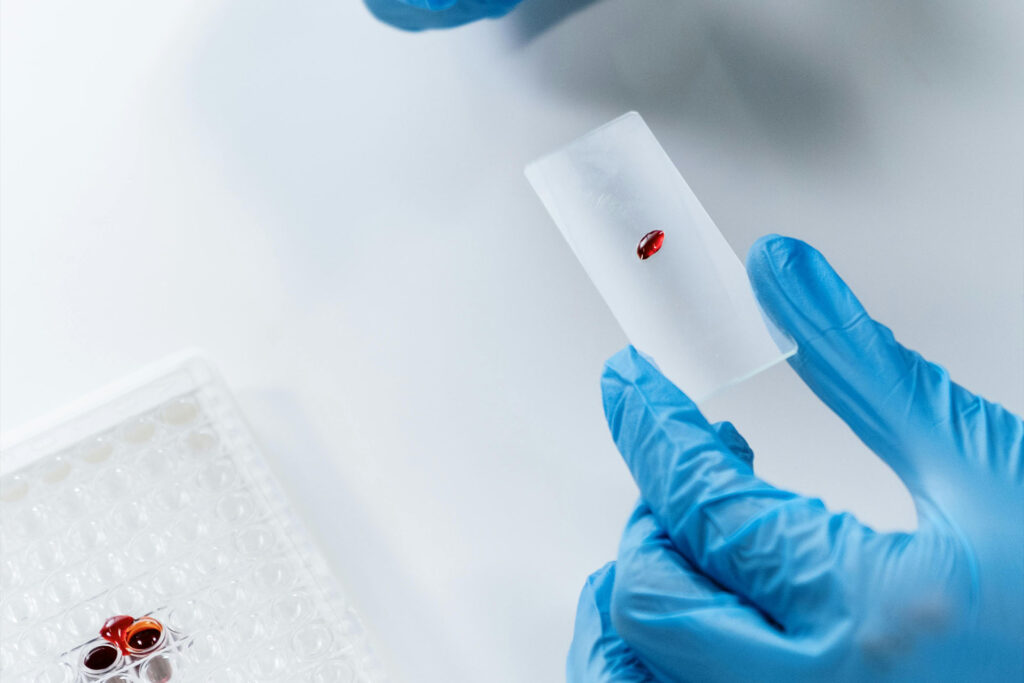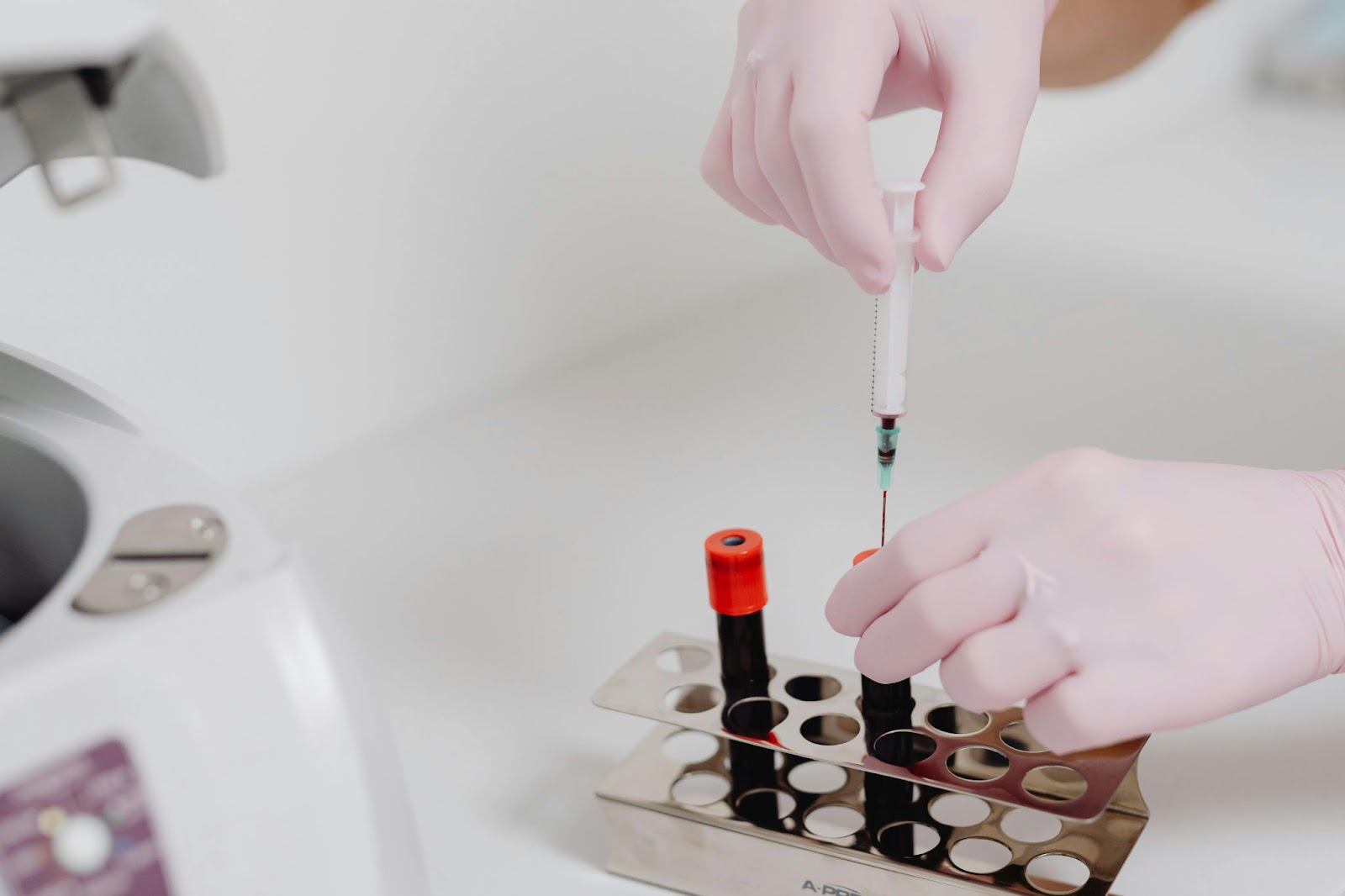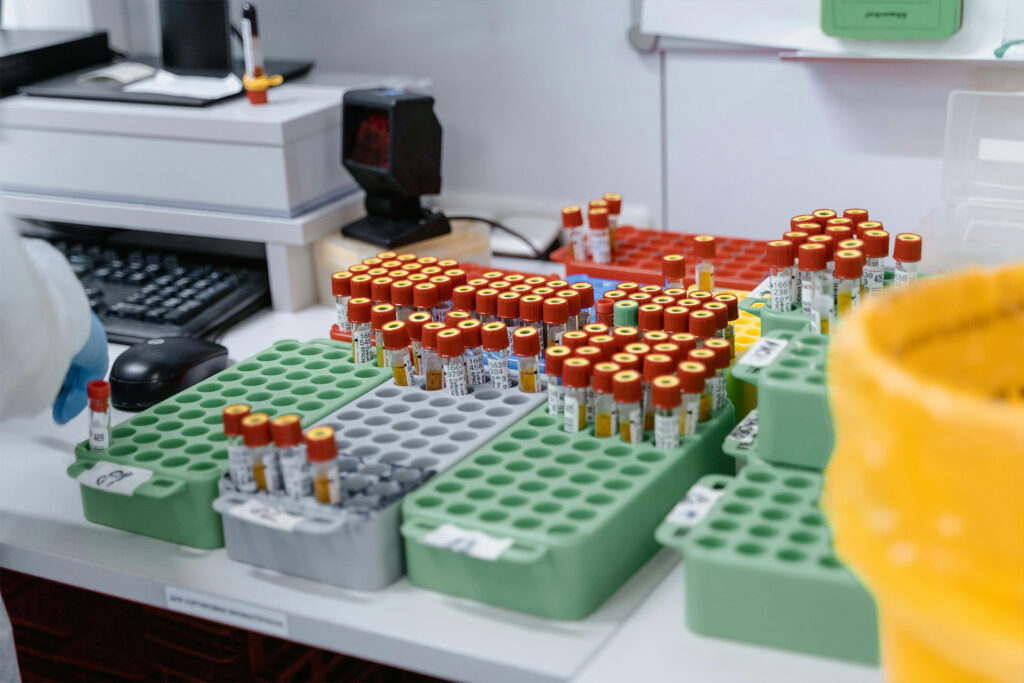Pathologists routinely perform several vital laboratory tests to evaluate patients’ health status and diagnose various medical conditions.
The most frequently ordered tests include the Complete Blood Count (CBC), which assesses blood cell levels and overall health; the Extensive Metabolic Panel (CMP), which examines kidney and liver function; and specialised tests like the Lipid Panel for heart health and Thyroid Function Tests for hormonal balance.
These common tests provide healthcare providers with essential information about a patient’s health status, enabling them to make informed decisions about diagnosis and treatment.
Common Pathology Tests
1. Complete Blood Count (CBC)
Among the most widely utilised diagnostic tools in modern medicine, the Complete Blood Count (CBC) serves as a thorough analysis of blood components that provides crucial insights into a patient’s overall health status.
The CBC measures red blood cells, white blood cells, and other critical elements, helping doctors identify various conditions.
Abnormal CBC results can indicate infections, anaemia, or more serious health concerns, making it indispensable for diagnosis and treatment planning.
2. Comprehensive Metabolic Panel (CMP)
The Extensive Metabolic Panel stands as a fundamental diagnostic tool that evaluates multiple aspects of a patient’s metabolic health through a single blood test.
This essential screening combines 14 distinct measurements, gauging kidney function, liver function, blood glucose levels, and electrolyte balance.
Healthcare providers rely on these results to diagnose conditions, monitor medication effects, and develop targeted treatment strategies.
3. Lipid Panel
Widely recognised as a cornerstone of cardiovascular health screening, lipid panel testing provides essential insights into a patient’s blood cholesterol and triglyceride levels.
This blood test measures HDL (good) and LDL (bad) cholesterol components, requiring 10–12 hours of fasting for accurate results.
Healthcare providers use these measurements, along with other risk factors, to assess a patient’s likelihood of developing heart disease.
4. Thyroid Function Tests (TFT)
Moving from cardiovascular health markers to endocrine system evaluation, Thyroid Function Tests serve as primary diagnostic tools for evaluating thyroid gland activity and hormone production.
These tests measure thyroid-stimulating hormone and related hormones to identify various health conditions affecting metabolism.
5. Liver Function Tests (LFT)
Several critical blood tests comprise Liver Function Tests (LFT), serving as primary diagnostic tools for evaluating hepatic health and function.
These tests measure specific enzymes, proteins, and other substances, including ALT, AST, and bilirubin.
When abnormal levels are detected, they can indicate various liver diseases, helping healthcare providers in diagnosing conditions like hepatitis, cirrhosis, or fatty liver disease.
6. Kidney Function Tests
Kidney function tests represent a fundamental set of diagnostic tools in pathology, providing detailed insights into renal health and functionality.
These tests measure key markers including creatinine and blood urea nitrogen levels in the blood. The estimated glomerular filtration rate, calculated from these values, helps healthcare providers assess kidney function and diagnose chronic kidney disease when necessary.
7. Coagulation Profile
Blood clotting assessment through coagulation profile testing stands as an essential component of modern pathology diagnostics.
This thorough panel includes critical measurements such as prothrombin time (PT), partial thromboplastin time, and international normalised ratio. These tests help diagnose bleeding disorders, monitor anticoagulant therapy, and evaluate patients before surgery.
Regular monitoring is particularly important for those with cardiovascular conditions or clotting risks.
8. Blood Glucose Tests
Among the most essential diagnostic tools in modern medicine, glucose testing serves as a cornerstone for diabetes detection and management.
Blood glucose tests measure sugar levels through various methods, including fasting tests that require 8–12 hours without food and haemoglobin A1c tests that show average levels over 2–3 months.
Results above 126 mg/dL while fasting may indicate diabetes, prompting further evaluation.
9. C-reactive Protein (CRP) Test
The C-reactive protein test stands as an essential diagnostic tool for detecting inflammation throughout the body. This blood test measures CRP levels to identify various conditions, including autoimmune diseases and infections.
With normal levels below 3 mg/L, elevated results above 10 mg/L may indicate significant inflammation and increased risk of cardiovascular disease. Healthcare providers often use CRP tests alongside other diagnostics to monitor treatment effectiveness.
10. Urinalysis
Routinely performed in clinical settings, urinalysis serves as a fundamental diagnostic tool that examines urine composition to detect various health conditions and metabolic abnormalities.
This clinical laboratory test evaluates multiple parameters, including pH and specific gravity, while screening for kidney disorders and urinary tract infections.
Results can indicate the presence of proteins, glucose, bacteria, or other substances that may signal underlying health issues.
Uses of Pathology Tests

Pathology tests serve as essential diagnostic tools that help healthcare providers identify and confirm various medical conditions through the analysis of blood, tissue, and other bodily specimens.
These valuable tests enable medical professionals to monitor chronic diseases effectively and assess how well treatments are working, providing vital data about disease progression and patient response to medications.
Regular pathology screening can detect potential health issues before they become severe, allowing for early intervention and better health outcomes through preventive care measures.
Diagnosing medical conditions
Medical diagnosis relies heavily on pathology testing as a cornerstone of modern healthcare, enabling physicians to identify and confirm various conditions through systematic analysis of body samples.
Key tests include complete blood count (CBC) for detecting anaemia and infections, liver function tests for identifying liver diseases, thyroid function tests for hormonal imbalances, and urinalysis for kidney disorders and infections.
Monitoring chronic diseases
Beyond initial diagnosis, the systematic monitoring of chronic diseases depends heavily on regular pathology testing to track disease progression and evaluate treatment effectiveness.
Regular blood testing, including complete blood count (CBC), thyroid function tests, and lipid panels, helps healthcare providers adjust treatment plans.
Additionally, renal function tests are essential for monitoring kidney health in patients with conditions like diabetes and hypertension.
Screening for health conditions
Healthcare providers rely extensively on pathology tests as powerful screening tools to detect potential health conditions before symptoms become apparent.
Tests like complete blood count (CBC), liver function tests, and thyroid function tests help identify abnormalities early.
Regular screening through lipid panels and other tests enables doctors to assess cardiovascular risks and develop preventive strategies for best patient care.
Assessing treatment effectiveness
Once a health condition has been identified through screening, pathology tests serve as essential tools for monitoring treatment progress and effectiveness.
Regular monitoring of blood cell counts through complete blood count (CBC) helps evaluate cancer therapy responses, while liver function tests (LFTs) track medication impacts.
Additionally, lipid panels assess how well cholesterol-lowering medications are working to reduce cardiovascular risks over time.
Importance of Regular Testing
Regular pathology testing serves as a cornerstone of preventative healthcare, enabling medical professionals to detect potential health issues before they become serious problems.
Through routine screenings and laboratory work, doctors can identify early warning signs of various diseases, including diabetes, heart disease, and certain types of cancer, allowing for prompt intervention and better treatment outcomes.
The systematic monitoring of key health indicators through regular testing not only helps in maintaining peak health but also provides valuable baseline data that healthcare providers can use to track changes in a patient’s condition over time.
Preventative health measures
Maintaining ideal health requires a proactive approach, with routine pathology testing serving as a cornerstone of preventative healthcare.
Common tests like blood screenings enable healthcare professionals to identify potential health concerns before they become serious issues.
Early detection through regular preventive health care not only improves treatment outcomes but also helps reduce long-term medical costs and complications.
Early detection of diseases
Building upon preventative healthcare practices, the early detection of diseases through systematic pathology testing represents a fundamental shift from reactive to proactive medical care.
Common pathology tests, including Complete Blood Count (CBC) and routine screenings, enable healthcare providers to identify potential health issues before symptoms develop.
FAQs
The Complete Blood Count (CBC) is the most common pathology test performed in medical laboratories.
This essential test measures various blood components, including red blood cells, white blood cells, and platelets.
Healthcare providers regularly order CBCs to evaluate overall health status, screen for disorders like anemia or infections, monitor existing conditions, and assess a patient’s response to treatments.
It’s a fundamental tool in medical diagnosis and health monitoring.
The Extensive Metabolic Panel (CMP) is often considered “the blood test that checks everything” because it provides a broad overview of your metabolic health through 14 different measurements.
This test evaluates essential components including glucose levels, kidney and liver function, electrolyte balance, and protein levels.
While fasting for 8–12 hours before the test, healthcare providers use CMP results to assess overall health, monitor existing conditions, and guide treatment decisions.
The Complete Blood Count (CBC) is the most frequently requested laboratory test in medical practice.
This essential test is routinely performed during physical examinations and medical screenings across healthcare settings.
With approximately 14 billion lab tests ordered annually in the United States, the CBC consistently ranks at the top.
Its quick turnaround time of usually within 24 hours and thorough evaluation of blood components make it invaluable for healthcare providers.
There are five main types of pathology tests commonly used in medical diagnostics: hematology tests, clinical chemistry tests, microbiology tests, immunology tests, and molecular pathology tests.
Each category serves specific diagnostic purposes, from analysing blood components to detecting genetic disorders.
Within these main categories, there are hundreds of specific tests that medical professionals can order depending on the patient’s symptoms and suspected conditions.

